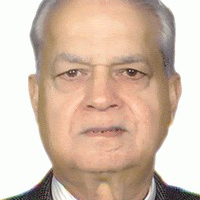Man Mohan Sharma
Man Mohan Sharma FREng is an Indian chemical engineer. He was educated at Jodhpur, Mumbai, and Cambridge. At age 27, he was appointed Professor of Chemical Engineering in the Institute of Chemical Technology, Mumbai.
Man Mohan Sharma is an Indian chemical engineer.[2] He was educated at Jodhpur, Mumbai, and Cambridge. At age 27, he was appointed Professor of Chemical Engineering in the Institute of Chemical Technology, Mumbai.[3] He later went on to become the Director of UDCT, the first chemical engineering professor to do so from UDCT.
In 1990, he became the first Indian engineer to be elected as a Fellow of Royal Society, UK. He was awarded the Padma Bhushan (1987) and the Padma Vibhushan (2001) by the President of India.[4] he has also been awarded the Leverhulme Medal of the Royal Society, the S.S. Bhatnagar Prize in Engineering Sciences (1973), FICCI Award (1981), the Vishwakarma medal of the Indian National Science Academy (1985), G.M. Modi Award (1991), Meghnad Saha Medal (1994), and an honorary Doctor of Science degree from Indian Institute of Technology, Delhi (2001).Sharma made contributions to chemical engineering science and technology. His studies on Bronsted based catalysis in CO2 hydration (published in the Transactions of Faraday Society) and subsequently kinetics of COS absorption in aqueous amines and alkanolamines brought out linear free energy relationship between CO2 and COS absorption in solutions of amines and alkanolamines. He has contributed extensively on the role of microphases in multiple reactions which he pioneered. He won the Leverhulme Medal of the Royal Society “for his work on the dynamics of multi-phase chemical reactions in industrial processes”.He has been honoured by several universities including IITs by honorary doctorates.
He has been awarded Bhatnagar Prize in Engineering Sciences (1973), the Vishwakarma medal of the Indian National Science Academy (1985), G.M,Modi Award (1991), Meghnad Saha Medal (1994).
He states:During my academic career, I always tried to work on problems which had industrial applications with commercially demonstrable results.
Our group at ICT started by measuring interfacial areas in liquid-liquid reactions. We were the first to do so using a chemical method, and triggered editorials in some journals within six months of publication.
A wide array of reactions in the chemical industry are bi-phasic and mass transfer controlled. Everyday products such as polymers (e.g. in plastics, clothes), petrochemicals, detergents (e.g. washing powder) and metals are produced with the help of these reactions. Our research has enhanced the understanding of these phenomena and made the production process in industry more efficient.
We then moved onto equipment-oriented research, specifically mixing equipment. Whilst many thought it was an old, hackneyed area of study, we still persevered. Together with my collaborator, Professor J.B. Joshi, we developed many novel types of mixing systems, such as the gas-inducing impeller design which has drastically improved the way gas-liquid reactions are carried out. Seeing our impellers in operation always fascinates young undergraduates. In addition, we have also developed cationic ion-exchange resins based processes at a commercial scale to mitigate pollution problems posed by homogeneous acidic reactants when released into waste water streams.
While designing research projects, the identification and impact of a problem is of paramount importance. However, one must always keep in mind the ability of a researcher to solve it within a given time frame; otherwise a scientific challenge stays a problem forever.

Man Mohan Sharma
Date of Birth: 01 May 1931
Birth Place: Jodhpur
Proffession: Indian chemical engineer
Nationality: Indian


